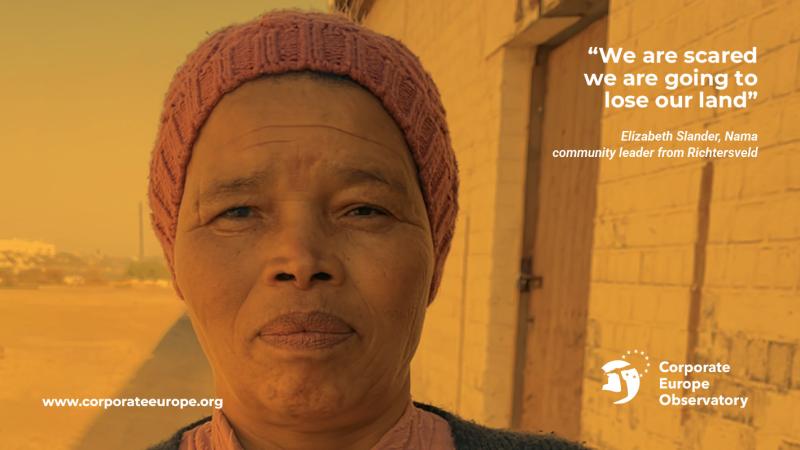Stay always informed
Interested in our articles? Get the latest information and analysis straight to your email. Sign up for our newsletter.

Brussels, 5 December 2024—Europe’s scramble for green hydrogen in South Africa will have a devastating impact on the very same local communities whose voices are being completely ignored by EU policy makers, according to a new report from Corporate Europe Observatory (CEO).
The EU has identified South Africa as a potential supplier for its huge projected green hydrogen import needs, which it is pursuing through the Global Gateway and bilateral partnerships. According to internal European Commission documents, preparations are underway for a deal on critical raw materials and green hydrogen between South Africa and the EU. Both sides are presenting it as a win-win scenario.
But testimonies from frontline communities affected by planned green hydrogen projects in South Africa reveal a different story. One of land grabs, resource exploitation and no free prior and informed consent, with local people left bearing the brunt of negative impacts as polluting industries continue with business as usual.
“The old fossil fuel companies are pushing green hydrogen. I don’t see them abandoning their way of making money,” said Given Zulu, Khuthala Environmental Care Group, from the coal-mining town of Ermelo, Mpumalanga province, which is now facing new green hydrogen developments. “I think it’s just a way of making the world shut up a bit … to say they are no longer polluting.”
Europe’s ambitions to import green hydrogen raises alarm bells about their potential consequences for communities and the environment in South Africa and across the world. Key impacts from the report, The Scramble for Hydrogen in South Africa, include:
Belén Balanyá, Corporate Europe Observatory researcher and campaigner, says:
"The so-called 'green hydrogen hype' is far dirtier than the polished narrative sold in Europe. The promise of win-win outcomes doesn't hold water when the reality on the ground shows no real path to development or decarbonisation for South Africa. Big polluters continue to profit while local communities and the planet pay the price.
Europe cannot decarbonise by outsourcing the damage to the Global South. A truly just transition must be global, and the scramble for hydrogen must be stopped before it causes more harm."
Yegeshni Moodley, Climate and Energy Campaigner, groundWork
“Green hydrogen reminds me of the great and powerful Oz, a smokescreen for a weak and deceitful pretender, preying on the fears and insecurities of those around him. The hydrogen lobby promises countries and communities wealth and prosperity, a seat at the energy table, and fair shares all around.
In reality, what we see are projects shrouded in confidentiality, located in areas that already bear the social and environmental burden of extractivism, communities locked out of discussions, and the looming burden of greater sovereign debt.”
Neville van Rooy, Community Outreach Programme Head, The Green Connection
“In South Africa's Northern Cape, "green hydrogen" projects threaten water, land, and oceans, but despite communities raising concerns, they’re ignored. When will marginalised communities get to decide for themselves what development they want?
For the indigenous Nama people, this is a second wave of land dispossession. The legacy of Apartheid lingers, as capitalism bulldozes communities deeper into poverty. But we will continue to support communities and fight to defend their land and ocean against oil, gas, and false solutions like the Boegoebaai green hydrogen project, as well as the neoliberal, neocolonial agenda behind it.”
ENDS
For media inquiries, please contact
Belén Balanyá, Corporate Europe Observatory researcher and campaigner
belen@corporateeurope.org; +31 633 090 386
Marcella Via, Corporate Europe Observatory press officer
media@corporateeurope.org; +39 348 420 14 35
Interviews with campaigners and communities on the ground can be arranged on demand.
Notes to editor
Testimonies from impacted communities
Walter Steenkamp, local fisherman and community leader in Port Nolloth (impacted by the Boegoebaai project): “Our government is selling us out... saying that there are no people living on this ground... But I’ve been living here for 50 years, and there are a lot of communities on this land.”
Mpho Selemela, Vaal Environmental Justice Alliance (impacted by Sasol's and AMSA's projects in the Vaal Triangle): “No one from their side or from the government has ever told us about green hydrogen. Most of the communities don’t know. The transition that is coming is not for us. It’s for businesspeople, maybe for their exports and their trade. But for us – we’re damaged."
Surprise Mashishi, Mining Affected Communities United in Action, (impacted by Anglo American's Hydrogen Corridor Valley project): “They have been building the solar panels and the people have been removed from their areas to other villages.
Elizabeth Slander, a Nama community leader from the town of Sandrift in Richtersveld, (impacted by the Boegoebaai project):
“We as South Africans aren’t using green hydrogen, so why should it be produced on our land? Why can’t it be developed in Europe or in other countries that need it?”
For more testimonies, please see here